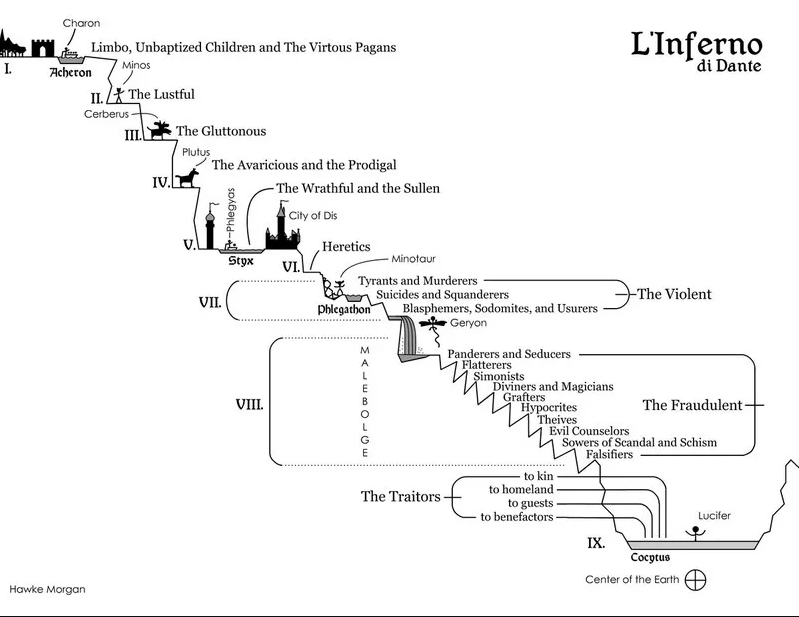background
- Limbo → circles
- Follows traditional views of Hell within Christianity
- Book of Revelation
- Sealed abyss where Satan dwelled
- Sinful dead thrown into lake of fire
- Pit sealed within bowels of earth
- Other sources
- Rivers from Virgil’s description from the The Aeneid
- Acheron
- Styx
- Phlegethon
- Cocytus
- Medieval vision literature (partial katabasis)
- Tundale’s Visions (1149)
- Treatise on Saint Patrick’s Purgatory (1180–84)
- Entertainment (vs. Greco-Roman school curriculum)
- Andreas Cappellanus The Art of Courtly Love (late 12th century)
- The Lives of Saints
- Roman and Latin sources
- Personal creativity
- Areas where neutrals are punished outside of Acheron
- Limbo
- Unconventional
- Virtuous pagans
- Children who die before being baptized
- Tradition of attacking Popes as political, rather than spiritual, leaders
- Layered nature of Dante’s knowledge
depiction of hell

- Formed from Earth retreating from the impact of Satan’s body
- Did not even want to touch it
- Tripartite notion of sin
- Seven deadly sins
- Incontinence: urges that stem from natural instincts
- No circle for
- Violence
- Fraud
- Aristotle’s Nicomachean Ethics
- Anti-Inferno
- Houses
- Souls who refuse to choose between evil and good
- Angels who did not side with God or Lucifer
- Cowards run chasing blank banner, bitten by nasty insects
- Unworthy of even entering hell
- Law of symbolic punishment
- Second circle of Hell guarded by Minos, Lust
- Bookends the two realms; furthest from Satan, closest to God
- Death by love; yielded
- Subjected reasons to desire
- Francesca da Rimini and Paulo, murdered by brother of Paulo and husband of Francesca
- Educated woman who shares literary interest with lover
- Psychological classification of sin in Inferno
- Based on motives rather than actions
- Christian theology over classical sources
Dante’s sources
- Hierarchical scheme of hell derived from Aristotle
- Incontinence
- Lust, gluttony, avarice, prodigality, wrath
- Materiality, not governed by reason
- Condemned for weakness in controlling self
- Triumph of instinct over reason
- Love dictated by God is regulated by reason
- Mad bestiality/violence
- Malice
- Acts conducted out of choice or intention and involves others
- → Grafts sins onto this scheme
- Fundamental system of organizing Christian afterlife from pagan philosopher
- Theological authorities
- Thomas Aquinas
- Augustine of Hippo
themes
